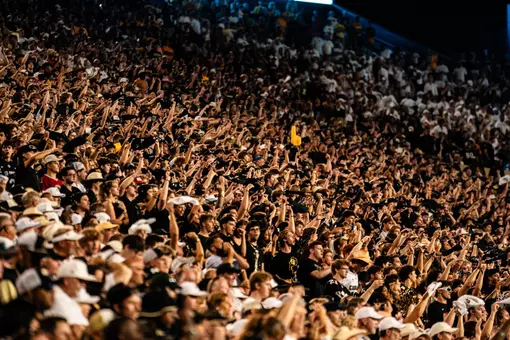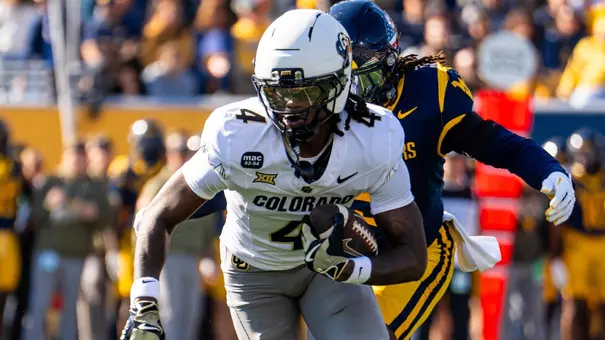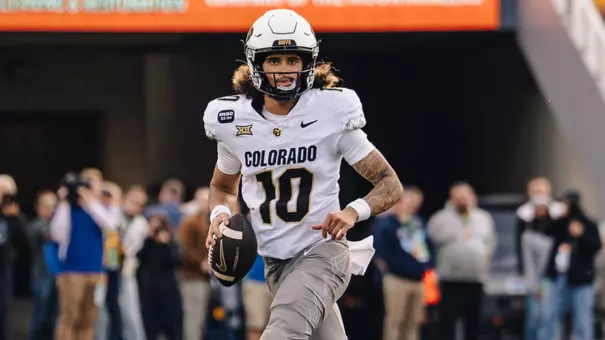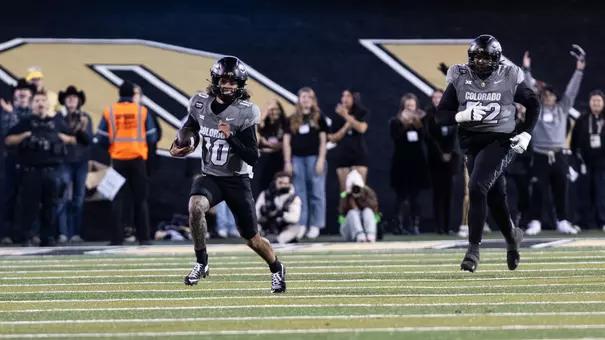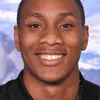Colorado University Athletics

Jay MacIntyre
Photo by: Tony Harman
Brooks: ‘J-Mac’ Making His Own Name In Dual Role For Buffs
September 16, 2016 | Football, B.G. Brooks
Every Day Carries Large But Welcome Responsibility For Coach’s Son
BOULDER – When Jay MacIntyre drew his first bead as a blocker on Derek McCartney, one can only imagine what might have been going through both of their heads.
Here was "J-Mac" – generously listed at 5-10, 190 pounds – looking to at least temporarily distract (leveling him was laughable) the 6-3, 250-pound McCartney, an outside linebacker with the proper accompanying temperament.
Remembered McCartney: "He's trying to block me and he's not used to it. When he'd block without cutting, I'd grab him and throw him. I was just bigger and stronger, but that would happen with all the outside backers and the smaller receivers."
"Grab and throw" might be soft-pedaling the fall-camp treatment MacIntyre endured. "All the linebackers – Derek, Jimmie Gilbert," he said with a laugh, "they like to bully me sometimes . . . I got beat up a little bit sometimes by those guys."
But he and McCartney acknowledge that improvement has been made. There still might be the beat downs, the occasional Big Man vs. Little Man mismatches in practice, but they have prepared MacIntyre for no-surprise Saturdays.
"Jay's actually gotten a lot better at it," McCartney said of MacIntyre's blocking. "He stays low, he keeps his feet moving. He does what he can. There's going to be times, because he's small and going against a bigger man, when it's a mismatch. But at the same time, he's a scrappy little guy. He's going to find a way to do something."
And that essentially encapsulates Jay MacIntyre's persona as well as his brief career at the University of Colorado, where overachieving and proving he belongs might as well be a dual major. "J-Mac" – for reasons as obvious as the head coach's last name – has accepted, even embraced, his lot in college football.
The oldest of Mike MacIntyre's two sons is a genuinely accepted, roundly appreciated Buff – although both father and son will tell you that acceptance is a process strongly linked to and ultimately acquired through productivity.
Speaking from experience, Mike, who had played for his late father George at Vanderbilt, established three tenets when Jay signed with CU two years ago.
"First of all, I told him he was never going to play quarterback," Mike said. "He had opportunities to play quarterback at other places. Then second, I told him you're always going to be scrutinized if you come here and play for me.
"Also, I told him you're a phenomenal young man, you can't screw up anything. If you screw up anything it ruins it for everybody. That's a lot of pressure on a kid, off the field, on the field, in everything that he does."
For sure, Jay is very aware; no reminding is necessary. Understandably, he might be more sensitive to his circumstances than most. But McCartney said the dynamic of a father-son relationship on the same team has "never been a problem here . . . everyone respects Jay, he's a great guy. Everyone sees how he works; he's just another teammate. That's just how it is here; he's our brother."
Brotherhoods are like respect: they usually require time and effort, which Jay accepted when making his decision to sign with the Buffs. He knew his father had played for his father at Vanderbilt, so advice was offered and well-received.
Mike MacIntyre told his son everything he did would be earned daily, including his position. "I think that's taught him a lot," Mike said. "He'll have to keep doing it, but I'm excited he's here. No. 1 he's a really good player, No. 2 I get to see my kid every day. So that's pretty cool."
The part about proving himself daily has never faded – Jay doesn't think it ever will – and that's not entirely bad.
"I don't think I'll ever really get past that point, honestly," he said. "It kind of drives me a little bit . . . but it's gradually getting better as I get on the field more and make plays. I'll just keep making plays and prove that I belong.
"I didn't think it would be a problem once I got on the field and proved myself but some people are like, 'Coach's son, he's only here because of his dad' – stuff like that. That's fine. I wasn't going to say anything; I wasn't going to talk or do anything.
"All I was going to do was come out here and play my heart out and keep working and never give up. That's the attitude you've got to have. It's been tough and it's going to stay tough. But we're winning games this year, it's been fun to see that and it's why I came here. I wanted to be a part of something special."
WHERE (AND HOW) DO I FIT?
When he signed with CU, after mostly playing quarterback at high schools in California (Valley Christian, San Jose) and Colorado (Monarch), his father had already told him there would be a position change.
Mike looked at Jay's athletic qualifications and almost immediately flashed back to his father and the role George MacIntyre played collegiately.
"He was like my dad, who played at Miami (Florida)," Mike said. "We thought (Jay) would be a really good slot receiver, a good punt returner, and we needed his quickness and speed."
So Jay, in addition to the scrutiny he was already under, began re-learning some football basics. As a QB at Valley Christian in San Jose, he said, "I was never asked to block . . . quarterbacks were never in any hitting drills, they take you out of all of that."
But when his father left San Jose State for CU and Jay transferred to Monarch, that changed. "They actually had the quarterback lead (the running back) through the hole and block," Jay recalled. "I'm not going to lie, I wasn't very good at it. I didn't really want to block anybody. I had that quarterback mentality."
When positions change, mindsets do too. If "J-Mac" was ever going to see the field as a receiver – a spot he'd never played – blocking was not to be shrugged off or left in the take-it-or-leave-it category.
"We have a 'knockdown' and 'cut' board in our room and so they take pride in going out there and getting DBs on the ground," said CU receivers coach Darrin Chiaverini, referring to his players getting weekly recognition in their position meetings for blocking. "Our receivers take pride in it, pride in blocking the perimeter when we make big runs or big plays on the perimeter with our receiving game."
Although Chiaverini, who played at CU (1995-98), had been a receiver in high school, he was much like Jay in being asked to block more and better at the college level. His receivers coach in Boulder (Karl Dorrell) stressed that catching passes was not the only facet of the position.
"I had to learn that; I wasn't a great blocker," Chiaverini said. "It was something he ingrained in me as a young player and it's something now I ingrain in our younger players."
Some receivers, though, might seem more physically adept than others at blocking on the perimeter. Take the Buffs' Bryce Bobo, who's 6-2, nearly 200 pounds and grew up (in a football sense) with blocking as a priority.
"I never had to be taught that," Bobo said. "I've always been an aggressive receiver, a lot bigger, and I use my frame, size and strength. I like blocking for my running backs and receivers, I kind of take it personal."
"J-Mac" has used weight room work to his advantage but of equal importance, noted Chiaverini, MacIntyre is "blue collar – and that's one of the best compliments you can give a kid. When I was a player I was blue collar; one snap and clear, play as hard as you can, good or bad, whatever happens move on to the next play. He's done a good job of that."
Really, though, there wasn't a choice if the coach's son was ever going to play more than occasionally, justify his presence, and contribute like he and his father envisioned.
"When they moved me to receiver I learned I had to block on the perimeter and especially in the slot," Jay said. "And that's how I'm going to get to play a lot of the times. So I got better and better . . . I think I'm blocking better than last year for sure.
"I brought the mentality in to block and if I don't do that I'm not going to play . . . in my mind it's part of the role and a big part of what I do this year is do the little things so other people can be successful."
CONFIDENCE IS CONTAGIOUS (AND EARNED)
As the Buffs prepare for Saturday's game at No. 4 Michigan (1:42 p.m. MDT, Big Ten Network), Jay's role on the team might have expanded beyond what he and others first imagined.
After two games he's CU's second-leading receiver (8 catches, 84 yards) and its top punt returner (7, 49 yards). With the exception of a touchdown catch his 2016 receiving numbers are identical to his final stats for his redshirt freshman season (12 games). Also, backing up Nelson Spruce in 2015, he had four punt returns for 37 yards.
Although he had returned punts in high school he had never played receiver, always working on the throwing end of that combination. Catching passes, particularly the route work and timing involved with the quarterback, created "a big learning curve for me," he admitted.
But he was willing to learn, study the veteran receivers in front of him and watch tape. Going deep into the playbook, knowing the offensive scheme back-to-front, and where on the field he might count on being open against any defensive scheme were mandatory.
All of the above, coupled with his work ethic, are vital. But don't sell him short on athleticism. In high school camps attended while deciding on a college, he was timed in the high 4.4-seconds in the 40-yard dash. And despite being a relative neophyte running routes, Chiaverini says "J-Mac" comes out of breaks extremely fast and is developing excellent ball skills.
Then there were the hours of off-season weekend work with senior quarterback Sefo Liufau. As soon as Liufau was able to return to throwing passes in his long rehabilitation from foot surgery (Lisfranc injury) he and Jay were throwing and catching.
Having been a high school quarterback, Jay knew this, and it was quickly reinforced when he became a receiver: A QB throws most to the receivers he trusts.
"I'm trying to gain that trust from (Liufau) each game, each practice," he said.
Asked if he was close, Jay answered, "I think so. We've still got a lot more games and I've got to keep proving myself to him and to other people. That's just life; you've got to keep proving yourself no matter what. You think you're proven then you've got to keep going. It never ends. Every day is a new battle to prove myself to the quarterbacks and coaches and become a better receiver."
Again, that could be the response of an overly sensitive overachiever. Liufau contended his trust in Jay is "definitely" there, adding that he has been "a lot harder" on his receivers this season in terms of "running routes, making catches and making plays. He's done a phenomenal job."
"I think a lot of people in the beginning were thinking, 'He's here because he's the coach's son,'" Liufau continued. "But this kid can play, I'm really excited and happy for him. I don't know if (the stigma of being the coach's son) will ever disappear, but he was never given anything more than our teammates.
"He was treated like any of the other guys and he definitely has earned respect on his own. That's the biggest thing – he's one of the hardest workers on the team. I know a lot of players say that about teammates but he definitely (is). He's not the fastest, not the biggest or strongest but he works hard and for the job he does on the field for us, you just can't replace a player like him."
Contact: BG.Brooks@Colorado.EDU
Here was "J-Mac" – generously listed at 5-10, 190 pounds – looking to at least temporarily distract (leveling him was laughable) the 6-3, 250-pound McCartney, an outside linebacker with the proper accompanying temperament.
Remembered McCartney: "He's trying to block me and he's not used to it. When he'd block without cutting, I'd grab him and throw him. I was just bigger and stronger, but that would happen with all the outside backers and the smaller receivers."
"Grab and throw" might be soft-pedaling the fall-camp treatment MacIntyre endured. "All the linebackers – Derek, Jimmie Gilbert," he said with a laugh, "they like to bully me sometimes . . . I got beat up a little bit sometimes by those guys."
But he and McCartney acknowledge that improvement has been made. There still might be the beat downs, the occasional Big Man vs. Little Man mismatches in practice, but they have prepared MacIntyre for no-surprise Saturdays.
"Jay's actually gotten a lot better at it," McCartney said of MacIntyre's blocking. "He stays low, he keeps his feet moving. He does what he can. There's going to be times, because he's small and going against a bigger man, when it's a mismatch. But at the same time, he's a scrappy little guy. He's going to find a way to do something."
And that essentially encapsulates Jay MacIntyre's persona as well as his brief career at the University of Colorado, where overachieving and proving he belongs might as well be a dual major. "J-Mac" – for reasons as obvious as the head coach's last name – has accepted, even embraced, his lot in college football.
The oldest of Mike MacIntyre's two sons is a genuinely accepted, roundly appreciated Buff – although both father and son will tell you that acceptance is a process strongly linked to and ultimately acquired through productivity.
Speaking from experience, Mike, who had played for his late father George at Vanderbilt, established three tenets when Jay signed with CU two years ago.
"First of all, I told him he was never going to play quarterback," Mike said. "He had opportunities to play quarterback at other places. Then second, I told him you're always going to be scrutinized if you come here and play for me.
"Also, I told him you're a phenomenal young man, you can't screw up anything. If you screw up anything it ruins it for everybody. That's a lot of pressure on a kid, off the field, on the field, in everything that he does."
For sure, Jay is very aware; no reminding is necessary. Understandably, he might be more sensitive to his circumstances than most. But McCartney said the dynamic of a father-son relationship on the same team has "never been a problem here . . . everyone respects Jay, he's a great guy. Everyone sees how he works; he's just another teammate. That's just how it is here; he's our brother."
Brotherhoods are like respect: they usually require time and effort, which Jay accepted when making his decision to sign with the Buffs. He knew his father had played for his father at Vanderbilt, so advice was offered and well-received.
Mike MacIntyre told his son everything he did would be earned daily, including his position. "I think that's taught him a lot," Mike said. "He'll have to keep doing it, but I'm excited he's here. No. 1 he's a really good player, No. 2 I get to see my kid every day. So that's pretty cool."
The part about proving himself daily has never faded – Jay doesn't think it ever will – and that's not entirely bad.
"I don't think I'll ever really get past that point, honestly," he said. "It kind of drives me a little bit . . . but it's gradually getting better as I get on the field more and make plays. I'll just keep making plays and prove that I belong.
"I didn't think it would be a problem once I got on the field and proved myself but some people are like, 'Coach's son, he's only here because of his dad' – stuff like that. That's fine. I wasn't going to say anything; I wasn't going to talk or do anything.
"All I was going to do was come out here and play my heart out and keep working and never give up. That's the attitude you've got to have. It's been tough and it's going to stay tough. But we're winning games this year, it's been fun to see that and it's why I came here. I wanted to be a part of something special."
WHERE (AND HOW) DO I FIT?
When he signed with CU, after mostly playing quarterback at high schools in California (Valley Christian, San Jose) and Colorado (Monarch), his father had already told him there would be a position change.
Mike looked at Jay's athletic qualifications and almost immediately flashed back to his father and the role George MacIntyre played collegiately.
"He was like my dad, who played at Miami (Florida)," Mike said. "We thought (Jay) would be a really good slot receiver, a good punt returner, and we needed his quickness and speed."
So Jay, in addition to the scrutiny he was already under, began re-learning some football basics. As a QB at Valley Christian in San Jose, he said, "I was never asked to block . . . quarterbacks were never in any hitting drills, they take you out of all of that."
But when his father left San Jose State for CU and Jay transferred to Monarch, that changed. "They actually had the quarterback lead (the running back) through the hole and block," Jay recalled. "I'm not going to lie, I wasn't very good at it. I didn't really want to block anybody. I had that quarterback mentality."
When positions change, mindsets do too. If "J-Mac" was ever going to see the field as a receiver – a spot he'd never played – blocking was not to be shrugged off or left in the take-it-or-leave-it category.
"We have a 'knockdown' and 'cut' board in our room and so they take pride in going out there and getting DBs on the ground," said CU receivers coach Darrin Chiaverini, referring to his players getting weekly recognition in their position meetings for blocking. "Our receivers take pride in it, pride in blocking the perimeter when we make big runs or big plays on the perimeter with our receiving game."
Although Chiaverini, who played at CU (1995-98), had been a receiver in high school, he was much like Jay in being asked to block more and better at the college level. His receivers coach in Boulder (Karl Dorrell) stressed that catching passes was not the only facet of the position.
"I had to learn that; I wasn't a great blocker," Chiaverini said. "It was something he ingrained in me as a young player and it's something now I ingrain in our younger players."
Some receivers, though, might seem more physically adept than others at blocking on the perimeter. Take the Buffs' Bryce Bobo, who's 6-2, nearly 200 pounds and grew up (in a football sense) with blocking as a priority.
"I never had to be taught that," Bobo said. "I've always been an aggressive receiver, a lot bigger, and I use my frame, size and strength. I like blocking for my running backs and receivers, I kind of take it personal."
"J-Mac" has used weight room work to his advantage but of equal importance, noted Chiaverini, MacIntyre is "blue collar – and that's one of the best compliments you can give a kid. When I was a player I was blue collar; one snap and clear, play as hard as you can, good or bad, whatever happens move on to the next play. He's done a good job of that."
Really, though, there wasn't a choice if the coach's son was ever going to play more than occasionally, justify his presence, and contribute like he and his father envisioned.
"When they moved me to receiver I learned I had to block on the perimeter and especially in the slot," Jay said. "And that's how I'm going to get to play a lot of the times. So I got better and better . . . I think I'm blocking better than last year for sure.
"I brought the mentality in to block and if I don't do that I'm not going to play . . . in my mind it's part of the role and a big part of what I do this year is do the little things so other people can be successful."
CONFIDENCE IS CONTAGIOUS (AND EARNED)
As the Buffs prepare for Saturday's game at No. 4 Michigan (1:42 p.m. MDT, Big Ten Network), Jay's role on the team might have expanded beyond what he and others first imagined.
After two games he's CU's second-leading receiver (8 catches, 84 yards) and its top punt returner (7, 49 yards). With the exception of a touchdown catch his 2016 receiving numbers are identical to his final stats for his redshirt freshman season (12 games). Also, backing up Nelson Spruce in 2015, he had four punt returns for 37 yards.
Although he had returned punts in high school he had never played receiver, always working on the throwing end of that combination. Catching passes, particularly the route work and timing involved with the quarterback, created "a big learning curve for me," he admitted.
But he was willing to learn, study the veteran receivers in front of him and watch tape. Going deep into the playbook, knowing the offensive scheme back-to-front, and where on the field he might count on being open against any defensive scheme were mandatory.
All of the above, coupled with his work ethic, are vital. But don't sell him short on athleticism. In high school camps attended while deciding on a college, he was timed in the high 4.4-seconds in the 40-yard dash. And despite being a relative neophyte running routes, Chiaverini says "J-Mac" comes out of breaks extremely fast and is developing excellent ball skills.
Then there were the hours of off-season weekend work with senior quarterback Sefo Liufau. As soon as Liufau was able to return to throwing passes in his long rehabilitation from foot surgery (Lisfranc injury) he and Jay were throwing and catching.
Having been a high school quarterback, Jay knew this, and it was quickly reinforced when he became a receiver: A QB throws most to the receivers he trusts.
"I'm trying to gain that trust from (Liufau) each game, each practice," he said.
Asked if he was close, Jay answered, "I think so. We've still got a lot more games and I've got to keep proving myself to him and to other people. That's just life; you've got to keep proving yourself no matter what. You think you're proven then you've got to keep going. It never ends. Every day is a new battle to prove myself to the quarterbacks and coaches and become a better receiver."
Again, that could be the response of an overly sensitive overachiever. Liufau contended his trust in Jay is "definitely" there, adding that he has been "a lot harder" on his receivers this season in terms of "running routes, making catches and making plays. He's done a phenomenal job."
"I think a lot of people in the beginning were thinking, 'He's here because he's the coach's son,'" Liufau continued. "But this kid can play, I'm really excited and happy for him. I don't know if (the stigma of being the coach's son) will ever disappear, but he was never given anything more than our teammates.
"He was treated like any of the other guys and he definitely has earned respect on his own. That's the biggest thing – he's one of the hardest workers on the team. I know a lot of players say that about teammates but he definitely (is). He's not the fastest, not the biggest or strongest but he works hard and for the job he does on the field for us, you just can't replace a player like him."
Contact: BG.Brooks@Colorado.EDU
Players Mentioned
WBB: Colorado vs Boise State - November 18th 2025
Wednesday, November 19
HIGHLIGHTS: Men's Basketball vs. Alabama State | Nov. 17, 2025
Tuesday, November 18
WBB: Colorado vs. Portland State Highlights | November 16, 2025
Monday, November 17
Volleyball: No. 22 Colorado vs. No. 8 ASU Highlights | November 15, 2025
Sunday, November 16


